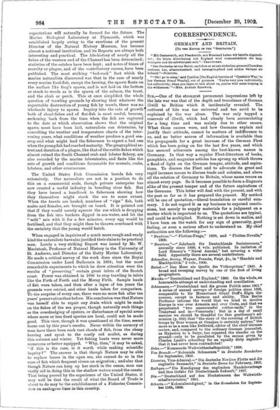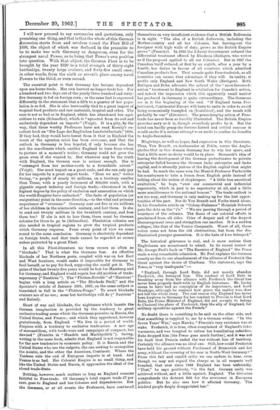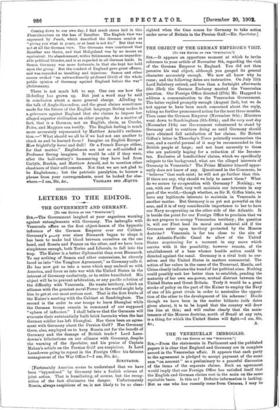CORRESPONDENCE.
GERMANY AND BRITAIN.
[TO TEE EDITOR OF TEE " SPECTATOR." J
" Kit Oesterreich, mit Frank-mid', mit Russland haben wir bereft' abgerech. net ; die letzte Abrechnung mit England wird vorauasichtlich die bap wierigste und die schvrierigste sein."--THEITSCHIP.
"Der Deutsche jet von Natur, nachdem er selnen einfachen grossen:Charaktar verloren hat, afterrednerisch and verunglimpfend und nights weniger ale liebend."—Nusuan.
" ' Oh I go to sleep,' said Cynthia [the English heroine of • Cynthia's Way,' to her German friend Wanda], out of patience. • You're very nice individually, but collectively, when you begin to talk about us, you're wild asses braying in the wilderness.' "—Men. ALFRED Sznowicx„ SIR,—One of the strongest permanent impressions left by the late war was that of the depth and truculence of German illwill to Britian which it incidentally revealed. The outburst of bile was too universal and too acrid to be explained by the war alone. The war only tapped a reservoir of illwill, which had clearly been accumulating for a long time and was mainly due to other causes. What those causes were, and how Germans explain and justify their attitude, cannot be matters of indifference to us, and no better source of information is available than the propaganda for a great increase of the German Fleet which has been going on for the last five years, and which has secured adherents among the best-known names in Germany. In that way a regular Fleet-literature of books, pamphlets, and magazine articles has sprung up which throws a flood of light on the German temper, attitude, and aspira- tions. To discuss the Fleet and to advocate its great and rapid increase means to discuss trade and colonies, and above all the relation of Germany to Britain, whose name recurs on almost every page. So it becomes possible to form a diagnosis alike of the present temper and of the future aspirations of the Germans. This letter will deal with the present, and with the past so far as it has prepared the present. My method will be one of quotation,—literal translation or careful sum- mary. I do not regard it as my business to expound conclu- sions, but merely to supply materials for a judgment on a matter which is important to us. The quotations are typical, and could be multiplied. Nothing is set down in malice, and I have been on the watch for any sign of generosity, good feeling, or even a serious effort to understand us. My chief authorities are the following :— "Nauticus."—" Flotten-Frage," 1898, and " Flotten-Novelle," 1900.
" Nauticus."—" Jahrbuch f fir Deutschlands Seeinteressen," annually since 1899, 4 vols. published. In imitation of Lord Brassey's " Naval Annual," but covering a wider field. Apparently there are several contributors.
Schmoller, Bering, Wagner, Franke, Voigt, 4'c., in " Handels mid Machtpolitik," 2 vols., 1900.
Rateel.—" Das Meer ale Quelle der Volkergr5sse," 1900. A broad and sweeping survey by one of the first of living geographers.
Marcks.—" Deutschland und England," 1900. On the whole, an honourable attempt at understanding and conciliation.
Schiernann.—" Deutschland and die grosse Politik anno 1901." A series of annual surveys of foreign politics since 1896, comparable to Sir Mounstuart Grant Duff's Elgin dis- courses, except in fairness and ability. This Berlin Professor informs the world that we tried to involve Europe in war over Armenia and over Crete, and that we perpetrated " two unsuccessful robber-raids," in the Transvaal and in—Venezuela! But in a day of small mercies we should be thankful for this gentleman's ad- mission (p. 389) that "the story of the covering of British troops by Boer women at Graspan is certainly untrue," the more so as a man like Delbruck, editor of the chief German review, and, compared to the ordinary German journalist, as Hyperion to a Satyr, has repeated the slander on the ground—only to be paralleled by the excuse given by Charles Lamb's schoolboy for an equally dirty exploit— that it had never been contradicted !
Dehn.—" Kommende Weltwirthschaftspolitik," 1898.
Von Brandt.—" Koloniale Schmerzen" in Deutsche Rundschau for September, 1902. Livonius, Vice-Admiral.—" Die deutsche Nordsee Flotte mid die englische Seewacht," in Deutsche Revue for February, 1902. Rathgen.—" Die Bundigung des englischen Handelsvertrags and ihre Gefahr fur Deutschlands Zukunft," 1897. Dis.—" Deutschland auf den Hochstrassen des Weltwirth- schaftsverkehrs," 1901.
Schurts.—" Kolonialmadigkeit," in the Grensboten for Septem- ber 11th, 1902.
I will now proceed to my summaries and quotations, only premising one thing, and that is that the whole of this German discussion starts from and revolves round the Fleet Bill of 1898, the object of which was declared in the preamble to be to make war with Germany so dangerous, even for the strongest naval Power. as to bring that Power's own position into question. With that object, the German Fleet is to be brought by the year 1920 to a total strength of thirty-eight battleships, twenty large cruisers, and forty-five small ones; in other words, from the sixth cr seventh place among naval Powers to the third, or even second.
The essential point is that Germany has become dependent upon sea-borne trade. Her own harvest no longer feeds her. For a hundred and two days out of the yearly three hundred and sixty- five Germany is fed on foreign corn ; or the same fact is expressed differently in the statement that a fifth to a quarter of her popu- lation is so fed. She is also irrevocably tied to a great import of tropical food products and raw materials, tropical and other. The case is not so bad as in England, which has abandoned her agri- culture to ruin (Schmoller), which is "uprooted from its soil and exclusively dependent on imports " (Voigt). It is a pity, by the way, that these worthy Professors have not read Koenig's ex- cellent book on "Die Lage der Englischen Landwirthschaft," 1898. If they had, they would have learnt from it that in England the worst of the agrarian crisis has been overcome, and that the outlook in Germany is less hopeful, if only because she has not the sea-climate which enables England to turn from wheat to pasture at a moment's notice; Germany could not grow the grass even if she wanted to. But whatever may be the truth with England, the German case is serious enough. She is "estranged from her mother-earth to a formidable extent" (Voigt). She must import on a great scale, and she can only pay for her imports by a great export trade. "Here we are," writes Sering, "a people of nearly 60 millions, on a territory smaller than Texas, with a yearly increment of 800,000 souls, with a gigantic export industry and foreign trade,—threatened in the highest degree by the policy of exclusion and annexation on which the world-Empires have embarked." The facts of population (or emigration) point in the same direction,—to the vital and primary importance of "overseas." Germany sent out five or six millions of her children in the nineteenth century, and lost them. Is she to send out twenty millions in the twentieth century, and lose them too? If she is not to lose them, there must be German colonies for them to go to (Schmoller). Plantation colonies are also needed in tropical regions to grow the tropical products which Germany requires. From every point of view we come round to the same conclusion. Germany is absolutely dependent on foreign trade, and that trade cannot be regarded as secure unless protected by a great Fleet.
In all this Fleet-literature no term recurs so often as " blockade." That is what the Germans fear. An effective blockade of her Northern ports, coupled with war on her East and West frontiers, would make it impossible for Germany to feed herself, or to pay for food, supposing she could get it. The gains of the last twenty-five years would be lost for Hamburg and for Germany, and England would regain her old position of trade- supremacy ("Nauticus "). The "Flotten-Novelle" of "Nauticus" begins with a long article on " The Blockade Peril," and the Spectator's article of January 16th, 1897, on the same subject is translated in full in the "Flotten-Frage." To avert blockade cruisers are of no use ; none but battleships will do (" Nauticus " and Ratzel).
Short of war and blockade, the nightmare which haunts the German imagination is provided by the tendency to great exclusive trading areas which the Germans perceive in Russia, the United States, and France.; and which they apprehend, however gratuitously, from England. " We live in a period of world- Empires with a tendency to exclusive trade-areas. A new age of mercantilism, with trade-wars and campaigns of conquest, has dawned" (Francke in " Handels and Machtpolitik "). Sering, writing in the same book, admits that England is not responsible for the new tendencies in economic policy. It is Russia and the United States who are the culprits, the one seeking to monopolise the Asiatic, and the other the American, Continent. Where the Yankees rule the end of European imports is at hand. And France is as bad. Her Colonial Empire is no small thing, and like the United States and Russia, it approaches the ideal of the closed trade-State.
Nothing, however, much matters so long as England remains faithful to Free-trade. Of Germany's total export trade 27 per cent, goes to England and her Colonies and dependencies. But the Germans, or at all events the Professors, have convinced
themselves on very insufficient evidence that a British Zollverein is in sight. " The idea of a British Zollverein, including the Mother-country and all her Colonies, but barring-out the foreigner with high walls of duty, grows as the British Empire grows" (Francke). In 1895 the Liberal Government refused the differential treatment offered by Rhodesia (Rathgen, who writes as if the proposal applied to all our Colonies). But in 1897 the Canadian tariff reduced, at first by an eighth, after a year by a fourth, her duties in favour of all countries which admitted Canadian products free. That sounds quite Free-traderish, as all countries can secure that advantage if they will. In reality, it profits only England and New South Wales (Rathgen). Both Rathgen and Dehn advocate the refusal of the "most-favoured- nation" treatment to England in retaliation for Canada's action, and indeed the impression which this apparently small matter has produced in Germany is quite extraordinary. The Germans see in it the beginning of the end. "If England turns Pro- tectionist, Continental Europe will have to unite in order to avoid being economically trampled on [brutaiisirt], and the result will probably be war" (Livonius). The peace-keeping action of Free- trade has never been so forcibly illustrated. The British Empire provokes envy as it is, though everybody profits by it. But the mind can hardly grasp the furious hatred and settled rancour it would excite if a serious attempt were made to confine its benefits to Anglo-Saxondom.
Misgivings, as well as hopes, find expression in this literature. Thus, Von Brandt, ex-Ambassador at Pekin, warns the Anglo- phobes that in this domain Germany has to win her spurs, and that a little more modesty would be in place. Bismarck's idea of leaving the development of the German protectorates to private enterprise failed because the German lacks enterprise and lacks capital, and is absurdly jealous of the English capital that might be had. In much the same vein the Munich Professor Fuchs tells his countrymen to take a lesson from English pride instead of talking about the nation of shopkeepers. "A little less uncritical exultation," he begs, "over our commercial and industrial superiority, which in part is no superiority at all, and a little more sensitiveness to the national honour." The trade outlook is not too rosy, and Germany is only making up for the lost oppor- tunities of the past. Nor do Von Brandt and Fuchs stand alone. In his Grenzboten article on "Colony-Staleness" Heinrich Schultz puts the dots on the "i's." "We are passing through a period of weariness of the colonies. The fiasco of our colonial efforts is proclaimed from all sides. Cries of despair and of the deepest discouragement cross and strengthen one another. It is a sudden collapse, like that of the Venice Campanile. Worst of all, these voices come not from the old obstructives, but from the dis- illusionised younger generation. It is the hate of love betrayed."
The historical grievance is real, and is more serious than Englishmen are accustomed to admit. In its recent review of Mr. George Peel's book on "The Enemies of England" the Times made a very remarkable admission. Mr. Peel explains tho German enmity as due to our abandonment of the alliance of Frederick the Great against the desire of Chatham. The statement, says the Times, is "very inadequate ":—
" England, through Lord Bute, did not merely abandon Frederick, she betrayed him. The conduct of Lord Bute in breaking away from the alliance with Frederick the Great has never been properly dealt with by English historians. Mr. Lecky seems to have had no conception of its importance, and Lord Stanhope, although he realised how grave the matter was, does not tell the whole story. The real reason why England has never been forgiven in Germany for her conduct to Prussia is that Lord Bute, the Prime Minister of England, did not scruple to betray to Choiseul the plans of Frederick, then the ally of England, for military operations against the French."
No doubt there is something to be said on the other side, and that something is supplied to me by a German writer. " In the Seven Years' War," nays Maras, "Prussia's very existence was at stake. Frederick, it is true, often complained of England's luke- warmness, and was tempted to refuse her humiliating subsidies. Bute dropped him [the Times goes much further], and it was not his fault that Prussia ended the war without loss of territory. Certainly the alliance was no ideal one. Still, how could Frederick have held his ground without Ferdinand of Brunswick and his army, without the covering of his rear in North-West Germany? " From this fair and candid critic we can endure to hear, even though we may not regard the charge as in all respects well founded, that ever since 1848 England has been unfriendly.
"That," he says positively, "is the fact. German unity was achieved without, and a little against, England. The historian comprehends the distrust felt for the newcomer in European politics. But he also sees how it affected Germany. The kindred people deeply disappointed her."
Coming down to our own day, I find much stress laid in this Fleet-literature on the loss of Zanzibar. The English view was expressed by Punch, which described the German cession as "giving you what is yours, or at least is not his." But that was not at all the German view. The Germans were convinced that Zanzibar was theirs, and that Heligoland was by no means an equivalent. Its abandonment, writes Schiemann, was an unpardon- able political blunder, and is so regarded in all German lands. In Samoa Germany was more fortunate, in that she kept her hold upon the group. But the conduct of England gave great offence, and was regarded as insulting and injurious. Samoa and other causes evoked "an extraordinarily profound illwill of the whole public opinion of Germany against England before the war" (Schiemann).
There is not much left to say. One can see how the ill-feeling has grown up. But just a word may be said in conclusion about a more general charge. Alluding to the talk of Anglo-Saxondom, and the great claims sometimes made for the future of the• English language, Sering makes it a grievance against England that she claims to impose her alleged superior civilisation on other peoples. As a matter of fact, that is a German, not an English, claim, as Czechs, Poles, and Magyars can testify. The English feeling is much more accurately represented by Matthew Arnold's exclama- tion :—" What should we all be if we had not one another to check us and be learned from ? Imagine an English Europe! How frightfully borng and dull ! Or a French Europe either, for that matter." Englishmen are not so self-satisfied as Professor Senng imagines. It would be odd if they were, after the half-century's hammering they have had from Carlyle, Ruskin, and Matthew Arnold, not to mention other chastisers of their self-conceit. Not that we are not glad to be Englishmen ; but the patriotic paralytics, to borrow a phrase from your correspondents, must be looked for else-












































 Previous page
Previous page